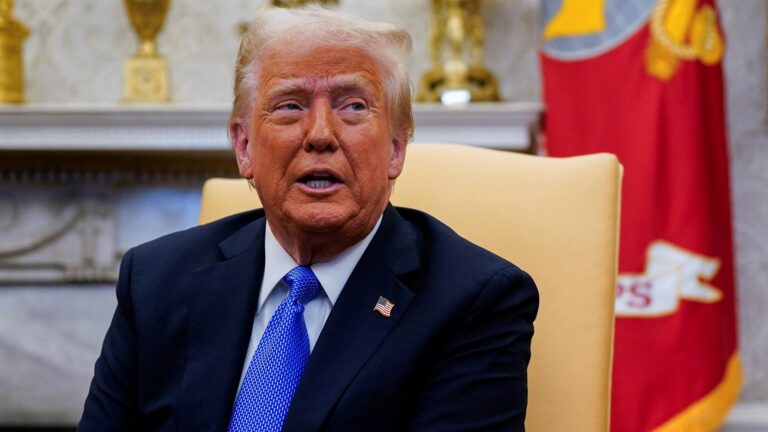Former President Donald Trump’s escalating rhetoric and aggressive stance toward China have raised alarms among policymakers and international observers alike. As tensions intensify between the world’s two largest economies, experts warn that Trump’s confrontational approach risks destabilizing an already fragile relationship. This article examines the implications of Trump’s increasingly hostile posture toward China and the potential consequences of his high-stakes game.
Trump’s Escalating Rhetoric Risks Severe Economic and Diplomatic Fallout
The recent surge in aggressive statements directed at China marks a dangerous escalation in U.S.-China relations with wide-reaching implications. Economic experts warn that the rhetoric could trigger retaliatory trade measures, disrupting global supply chains and raising costs for American consumers. Key industries such as technology, manufacturing, and agriculture may face heightened tariffs, export restrictions, and regulatory hurdles, potentially leading to a slowdown in economic growth. The unpredictability of this stance is already spurring market volatility and chilling international investment, signaling a looming risk that the current diplomatic posture may backfire.
Diplomatic channels, which have traditionally been critical in managing complex bilateral issues, risk becoming further strained amid rising tensions. Analysts highlight several immediate concerns:
- Reduction in bilateral dialogue: Limiting communication increases the risk of miscalculations or unintended conflicts.
- Escalation of military posturing: Increased hostility may provoke tension in contested areas like the South China Sea.
- Global alliances at risk: Allies striving for neutrality might be forced to choose sides, destabilizing established partnerships.
| Potential Impact | Short-Term | Long-Term |
|---|---|---|
| Trade | Supply chain disruptions | Prolonged tariff wars |
| Diplomacy | Fewer high-level talks | Strategic decoupling |
| Markets | Increased volatility | Reduced foreign investment |
Analysis of Beijing’s Potential Responses to Heightened U.S. Hostility
In response to escalating U.S. hostility, Beijing is likely to adopt a multifaceted approach aimed at both de-escalation and strategic recalibration. Diplomatic channels will be reinforced to manage tensions, but there will also be a clear message of deterrence through military modernization and asserting territorial claims. Economically, China may accelerate efforts to reduce dependency on American technology and supply chains, bolstering partnerships with other global powers. This dual strategy seeks to balance China’s need to avoid open conflict while safeguarding national sovereignty and long-term interests.
Potential Chinese responses may include:
- Strengthening alliances with Russia and other non-Western countries
- Expanding military exercises near contested regions such as the South China Sea
- Increasing tariffs or regulatory measures targeting U.S. firms
- Greater investment in indigenous technology and infrastructure
| Response Type | Key Actions | Potential Impact |
|---|---|---|
| Diplomatic | Engage in high-level talks, strengthen multilateral forums | Mitigation of immediate conflict risks |
| Military | Enhanced drills, increased defense budget | Heightened deterrence, regional power projection |
| Economic | Supply chain diversification, tariffs on U.S. goods | Reduced economic vulnerabilities |
| Technological | Accelerated development of indigenous tech | Long-term strategic independence |
Strategic Steps for De-escalation Urged by Experts to Avoid a Dangerous Confrontation
Amid escalating tensions, experts emphasize the urgent need for calm and calculated diplomacy to prevent a full-blown conflict between the U.S. and China. Analysts recommend implementing measured communication channels and resuming strategic dialogues to defuse misunderstandings. National security advisors stress the importance of avoiding provocative rhetoric and actions, which could unintentionally trigger a dangerous chain reaction on the international stage.
Key recommendations include:
- Establishing bilateral crisis hotlines to ensure rapid responses during critical incidents.
- Engaging in multilateral forums to build consensus and keep diplomatic doors open.
- Enhancing economic cooperation to create mutual incentives for peace and stability.
| Step | Objective | Expected Outcome |
|---|---|---|
| Crisis Hotline | Direct communication | Rapid conflict resolution |
| Multilateral Engagement | Diplomatic collaboration | Reduced tensions |
| Economic Cooperation | Mutual economic benefits | Incentivized peace |
To Wrap It Up
As tensions between the United States and China continue to escalate under Trump’s increasingly confrontational approach, the risks of miscalculation and economic fallout grow more pronounced. Experts warn that while tough rhetoric may appeal to certain domestic audiences, it carries the potential to undermine global stability and diplomatic efforts. Navigating this complex relationship will require careful strategy and restraint-elements that appear to be in short supply as the feud intensifies. The coming months will be critical in determining whether diplomacy can prevail or if both nations edge closer to a perilous standoff.




